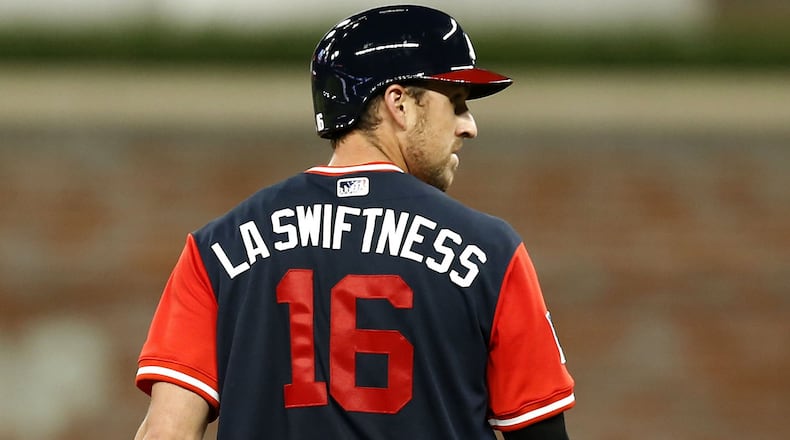Two words saved Lane Adams’ career.
“What if?”
Adams, the Braves’ outfielder who has become their go-to pinch-hitter, came close to an early retirement a summer ago.
The Yankees released Adams from their Double-A affiliate July 29, 2016. He pondered a career-change at just 26 years old. Basketball was his initial thought, but he didn’t have an actual plan. He just had reservations about continuing down what appeared to be a dead end.
“If you’d have told me I’d be in this situation now, I don’t know if I would’ve believed it,” Adams said. “…To be here in this clubhouse, with these guys, honestly I didn’t even think it was possible.”
The Braves signed Adams in December. He wasn’t invited to big-league spring training. And he wasn’t exactly recognizable, either.
“I didn’t know who he was,” Braves manager Brian Snitker said. “I’d never heard of him.”
Adams ended up playing a minimal amount in late spring-training games. Snitker said he noticed his tools: big, strong, fast. Once Adams impressed at Triple-A Gwinnett, the team felt comfortable calling him up.
Now, he’s spearheading perhaps the best pinch-hitting situation in the majors. The Braves have 40 pinch-hit RBIs, most in the majors. Adams is 10-for-38 (.263) with a homer and nine RBIs in those situations.
Adams said he’s gotten more comfortable with the role as the summer has continued. The stats agree: In his past 21 pinch-hit appearances, he’s hitting .368 (7-for-19) with three doubles, four RBIs and a pair of walks.
“Just trying to be prepared,” Adams said. “I do a lot of video work, especially with our analytics guy. He has heat maps he brings to me every day where every pitcher goes, where they throw their pitches in the zone. Just try to be ready. You never know, especially in the National League. The strategy changes with each batter.”
Adams said he spends the first three or four innings “mellowed out” and studying the pitcher. He stays ready, and if he reaches base, his speed is an asset this Braves team otherwise lacks.
“He’s one of those guys that’s had big pinch-hits,” Snitker said. “He might go out there and steal a base when they know he’s going to. … You look around in situations, and he’s always stretching. Just waiting for you to look at him. … Very valuable having a piece like that. Because he has weapons. You can put him in at first, and he can steal second, force his way into scoring.”
Adams doesn’t know if his success will translate to anything more than a fourth-outfielder spot. While he said everyone wants to be an everyday player, he acknowledged the Braves’ starting outfield (Matt Kemp, Ender Inciarte, Nick Markakis) is a strong group. But once contemplating a new life, Adams is perfectly fine with coming off the bench.
“It means a lot, just coming from where I was last year,” he said. “I wasn’t invited to major league spring training. I got released out of Double-A last year, so to be given this opportunity, and to take advantage of it, and to keep preparing every day throughout the season, it means a lot.”
Like last summer, Adams’ support system has been invaluable.
“The supporting cast from my family, friends from back home has always been there,” he said. “They always pick you up. They’re always there in your highest and lowest times. When confidence in yourself kind of depletes, they’re always there to pick you up and build you up, believe in you when you don’t believe in yourself. And that support (is) big for individual success.”
And it was them, specifically his mother, who helped push him not to forfeit a baseball career.
“You don’t want to look back and be like, ‘What if,’” Adams said his mother told him. “Your biggest regret is going to be you looking back and wondering if you could’ve done something different. So that’s how I go about every day.”
That advice has been mutually beneficial for Adams and the Braves. Thirteen months after he was released, Adams may have found a place he’ll stick with for a while.
About the Author
Keep Reading
The Latest
Featured


